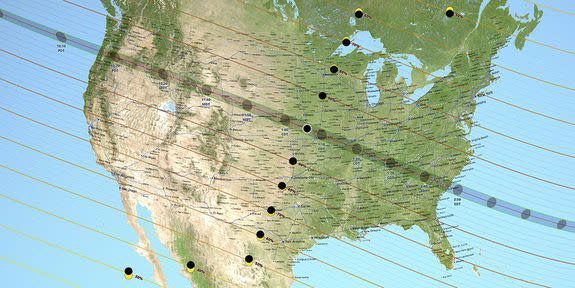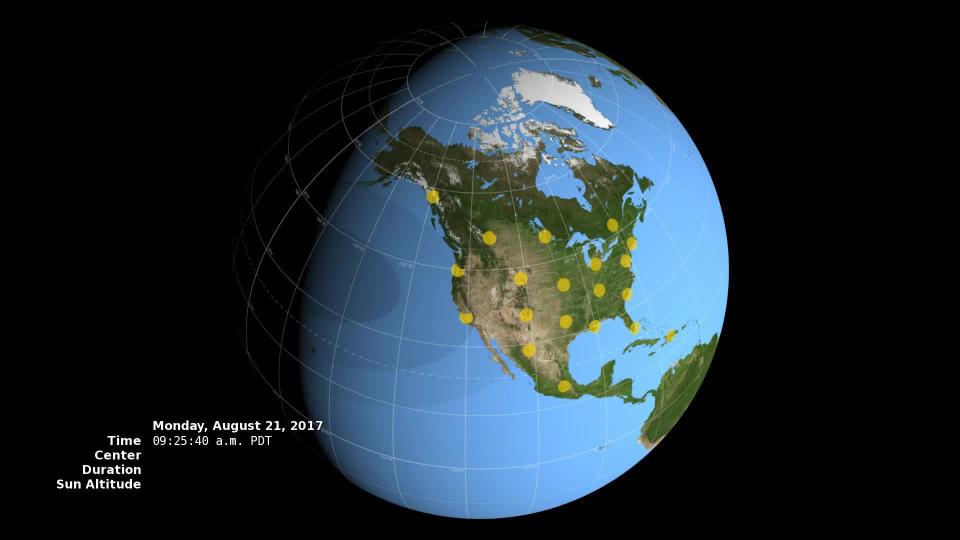Ridiculous solar eclipse lodging costs will make you want to watch it online

The total solar eclipse in August will only darken skies above parts of the U.S. in its line of totality for barely 3 minutes, but for that brief time, people are shelling out big money for hotels, campsites, cruise ships, and more.
SEE ALSO: New solar eclipse simulator shows you what to expect this summer
On Aug. 21, the first total solar eclipse will cross over the entire continental U.S. since 1918. This is a big deal for astronomers, scientists, and everyone else eager to see the moon pass across the sun.
Hotels, home rental sites like Airbnb and Craigslist, and tourism boards in places geographically lucky to fall along the eclipse's path are capitalizing on the rare solar event that's attracting visitors from all over.

Image: nasa
$2,000 for 3 minutes
Craigslist and Airbnb listings are out of control for the solar eclipse, stuffed with overpriced student apartments and backyard spaces.
Even Oregon's state parks are going for ridiculous prices with many camp sites completely booked. The state parks foundation auctioned off 30 additional campsites that went went for $60,000. That's more than $300 per person if every campsite has six people. A typical campsite any other time of the year is $20 a night.
In the Corvallis and Bend areas in Oregon, camp sites and RV stays in backyards and open spaces are going for $100 to pitch a tent for the night and $200 for an RV site. Another Oregon campsite is even pricier with $200 nightly rates to pitch a tent and $250 for an RV site. A private Oregon ranch, meanwhile, is charging $1,500 to bring an RV to the property.
Airbnb has 31,000 guests who've booked stays for the night of Aug. 20 ahead of the big day in places on the eclipse path, a company spokesperson said. Nashville and Charleston, South Carolina, are hosting the biggest numbers with nearly 8,000 and more than 2,300 bookings, respectively.
At least in Lincoln City, Oregon, where the eclipse begins, 85 listings were still available at time of writing. At other spots across the path it's getting tougher (and pricier) to even find somewhere to stay.
Some of the priciest Airbnb listings near the start of the eclipse in Madras, Oregon, are going for upwards of $2,000 a night. A room in a small town in Oregon is available for $500.
The per night rates at a house rental in Casper, Wyoming is $8,000, while tent camping on a 3-acre lot in Idaho Falls, Idaho is $200.
This is getting out of hand.
Unlikely hot spots

Image: NASA’s Scientific Visualization Studio
To get a sense of eclipse mania look no further than Carbondale, Illinois. The small university town is all in for the eclipse. The southern Illinois city happens to be where the eclipse will last the longest: a full 2 minutes and 38 seconds.
Jannika Lopez, the eclipse assistant coordinator from the city's tourism bureau, said the university, Southern Illinois University (SIU), has been preparing for Aug. 21 for the past three years. Now the city is planning events for the expected 55,000 viewers. The city usually has a population of 26,000.
"For us we’re not terrified or nervous," Lopez said during a phone call. Instead, city officials are framing the influx of sky-gazers as a college graduation weekend — times three. "We can handle it."
SIU is hosting a ticketed event with NASA broadcasting live from the stadium and Bill Nye will check in on the Jumbotron. In downtown Carbondale, the city is turning off all the lights even though it will be early afternoon, 1:20 pm CT, when the total eclipse arrives. Only a few hotels have availability left more than a month out.
Get ready for the August 21, 2017 solar eclipse! Find out what you'll see based on location. Watch: https://t.co/cUZHxm8lcX #Eclipse2017 pic.twitter.com/rPBrm2qPw6
— NASA (@NASA) June 21, 2017
More big names outside of pop science are coming to the Midwest town for the natural wonder. Ozzy Osbourne is performing his '80s hit Bark the Moon at peak totality at a nearby music festival aptly named Moonstock.
Moving eastward, the entire state of Tennessee is gearing up for the eclipse even if only parts of the state is on the path.
Kevin Triplett, commissioner of tourist development for the state, said in a phone call that his department has been planning for the big day for over a year. As many as 1.4 million people are expected to attend events throughout the state. A viewing event in the Great Smoky Mountains National Park sold out almost instantaneously.
"Everyone is getting the eclipse bug," Triplett said.
The eclipse ends near Charleston, South Carolina, so the southern city has jumped on the eclipse bandwagon as well for its minute and a half of darkness with hotel packages and viewing events.
Eclipse overload on the cheap
It's not just expensive house rentals and overpriced campsites for the rare eclipse sighting; there's also a special Royal Caribbean eclipse cruise for $1,000 and a $4,000 five-day Oregon getaway with Packing for Mars author Mary Roach and UC Berkeley astronomer Steven Beckwith. But for the rest of us far from the path of totality or stuck in an office on a Monday, the internet offers a plethora of ways to see what's happening up in the sky.
Instead of heading to Carbondale with the rest of eclipse-obsessed tourists, you can stream the peak totality or simulate what will happen — no camping or $200 Airbnb fees required. Even if you're not right on the path or nearby, anywhere in continental America will experience at least a partial eclipse — so it's still worth it to step outside and safely observe the phenomenon.

Image: SCREENGRAB/MEGAMOVIE PROJECT
NASA has a separate website dedicated to all things solar eclipse. The Great American Eclipse has become something of a clearinghouse for eclipse details and a competitor site Eclipse 2017 is trying to get in on the surge in web traffic and includes a list of cities in the eclipse path.
Apps like this total eclipse timer are an option for people to follow along on their smartphones, while The Weather Channel will use AR and other high-tech design to show the darkening sky on TV and online.

NASA is also streaming the whole thing, and UC Berkeley teamed up with Google to create a simulator to tee everyone up for the real deal.
For something under 3 minutes, this is taking over. At least it leaves plenty of time to prep for the next one in 2024.
WATCH: Watch clouds move above Saturn's largest moon in new NASA video


